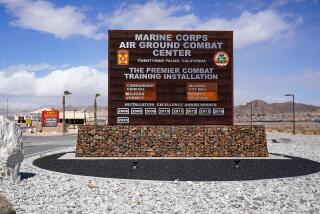Indian Activists Occupy Canada Military Base
- Share via
TORONTO — In the latest in a series of summer confrontations between native activists and authorities across Canada, about 100 Indians occupied a military base on Lake Huron on Monday after forcing military police to vacate the facility.
A spokesman for the Department of National Defense said that 20 military police officers who work at the base moved out early Sunday to avoid further clashes with the occupiers, some of whom are descendants of Chippewas who lived on the land before the Canadian army took it over during World War II.
Capt. Ellis Landale said military police would limit their duty to patrolling the perimeter of Canadian Forces Base Ipperwash, in southeastern Ontario near the Michigan border. The military has been reducing its activities on the base and was planning to return it to Indian control after removing munitions and environmental hazards.
Landale said an undetermined number of potentially dangerous training devices, such as simulated artillery shells and parachute flares, litter rifle and artillery ranges on the 400-acre base. He said it was unclear whether plans to clean up the material will go forward.
The base takeover followed by one day a raid by Quebec provincial police near Oka, not far from the New York border, where authorities pulled up thousands of marijuana plants growing on property given by the federal government to Mohawks.
Police acknowledged they had known about the marijuana for some time but had hesitated to enter the area because Mohawk leaders generally oppose the presence of non-native police. After the pot fields were disclosed by the Canadian Broadcasting Corp., police negotiated an anti-drug operation with native law enforcement from a nearby Mohawk reservation. No one has been arrested.
Earlier, a dispute over native fishing rights in New Brunswick disrupted salmon runs in that Atlantic province, and Indian protesters put up roadblocks in British Columbia, where talks with the provincial government are under way on Indian land claims.
In dealing with the protests, authorities generally favor negotiation over confrontation, fearing a repetition of the violence surrounding a 1990 clash between the Quebec government and Mohawks near Oka. In that case, the aggressive response by authorities resulted in the shooting death of a police officer and provoked a national crisis. The army had to be called in.
But a backlash against non-confrontational policies is beginning to develop. “If we have laws in Canada, then everyone should have to obey them equally,” said Garry Breitkreuz, a member of Parliament from Saskatchewan and spokesman on justice matters for the opposition Reform Party.
The Canadian military confiscated the land for the Ipperwash base from the Chippewas in 1942 with the promise it would be returned when the military no longer needed it. The government has been negotiating the transfer; a tribal splinter group has occupied parts of the base since 1993.
More to Read
Sign up for Essential California
The most important California stories and recommendations in your inbox every morning.
You may occasionally receive promotional content from the Los Angeles Times.












